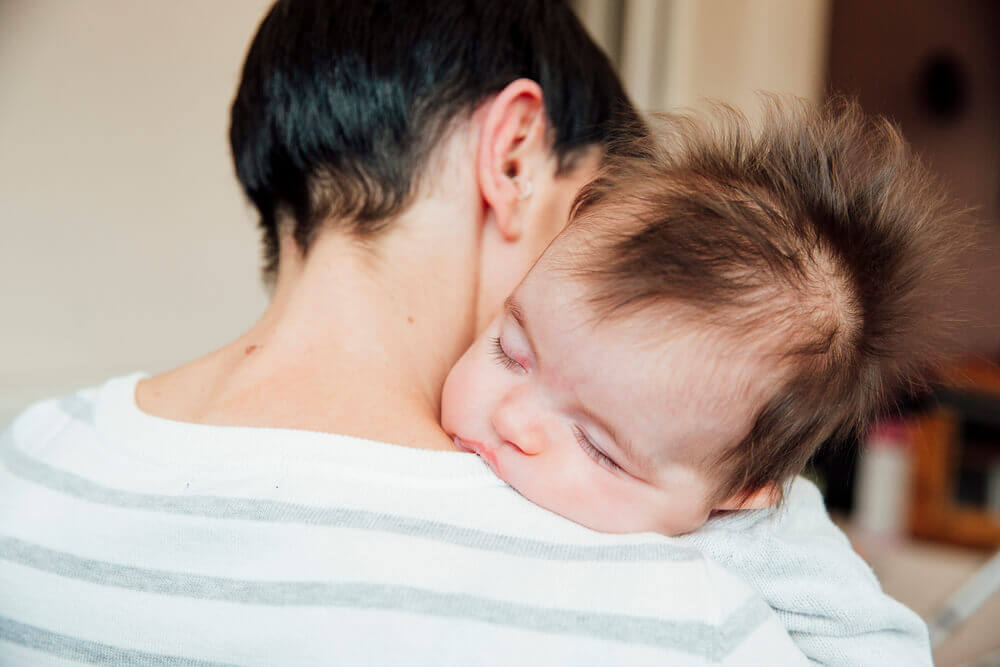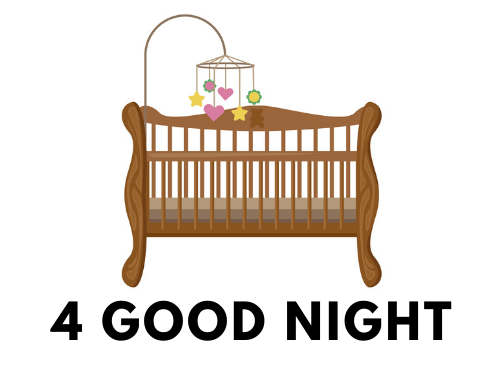Intro
Are you a new mom finding yourself puzzling over your 2-month-old’s sleep schedule? You’re not alone! Babies have unique sleep patterns that can be a bit challenging to understand at first. This comprehensive guide is designed just for you.
It contains everything you need to know about your 2-month-old’s sleep schedule, from understanding their sleep patterns to managing daytime naps, safe sleep practices, dealing with sleep disruptions, and more. By the end of this post, you’ll be well-equipped to ensure your little one gets the rest they need for healthy growth and development.

Understanding the Sleep Patterns of a 2-Month-Old:
Babies are not born with an inherent sense of night and day, which influences their sleep patterns. However, by two months, your baby might start to develop a more predictable sleep pattern.
They typically sleep 15 to 16 hours a day, including naps, with one longer stretch during the night. Understanding these patterns will help you better adapt to your baby’s sleep needs and adjust your schedule accordingly.
Ideal 2-Month-Old Sleep Schedule: What Should It Look Like?
At two months, babies typically sleep for shorter periods during the day and longer stretches at night. They might sleep for 4-6 hours at night, then have two to four naps during the day, each lasting around 1-2 hours.
However, remember that every baby is different, and these numbers are only averages. Listen to your baby’s cues and adjust their sleep schedule as needed.
Managing Daytime Naps for Your 2-Month-Old Baby
Napping is crucial for your 2-month-old. These short bursts of sleep help them process information and grow. Aim for two to four naps per day, each lasting 1-2 hours. To ensure these naps are effective, make sure the sleep environment is quiet and comfortable.
Over time, you’ll start to notice a nap pattern emerging, which can make scheduling your day a bit easier.
Feeding and its Impact on 2-Month-Old Sleep Cycle
Feeding plays a significant role in influencing your baby’s sleep schedule. At two months, babies typically feed every 2-4 hours, which can disrupt their sleep.
Try to ensure that your baby is well-fed before naptime and bedtime to encourage longer sleep stretches. However, it’s perfectly normal if your baby wakes for feeds during the night.

Night-time Sleep for a 2-Month-Old: How Long is Enough?
At two months old, most babies start to sleep longer at night, with one stretch lasting anywhere from 4-6 hours. This longer sleep phase usually happens in the early part of the night.
However, remember that every baby is different, and what works for one might not work for another. Don’t stress if your baby doesn’t sleep this long; they’ll get there in their own time.
Relevant Sleep Patterns for 2-Month-Old Table
| Sleep Factor | Average Duration | Importance | Tips for Parents |
|---|---|---|---|
| Total Sleep Time | 15-16 hours | Adequate sleep is crucial for baby’s growth and development | Try to ensure a quiet, comfortable sleep environment |
| Nighttime Sleep | 4-6 hours | Longer night stretches help baby adapt to day-night cycle | Make sure baby is well-fed before bedtime |
| Daytime Naps | 1-2 hours (2-4 times) | Naps help baby process information and grow | Look for signs of sleepiness to know when baby needs a nap |
| Feeding | Every 2-4 hours | Frequent feeding can disrupt sleep but is crucial for baby’s nutrition | Try to feed baby before naptime and bedtime |
Identifying Sleep Regression in Your 2-Month-Old
Sleep regression is when a baby who’s been sleeping well suddenly starts waking up more often or has difficulty falling asleep. At two months, your baby might experience a sleep regression due to growth spurts or developmental milestones. If you notice a sudden change in your baby’s sleep pattern, it might be a sleep regression. This is normal and usually temporary.
The Connection Between Sleep and Development at 2 Months
Sleep is essential for your baby’s growth and development. It’s when their body grows and their brain develops. At two months, babies are learning a lot and their brains are growing rapidly, which can sometimes disrupt their sleep. It’s crucial to ensure your baby is getting enough sleep to support their development.

Creating a Bedtime Routine for Your 2-Month-Old
A consistent bedtime routine can help signal your baby that it’s time to sleep. This routine can include activities like a bath, reading a book, or singing a lullaby. The key is to keep the routine consistent and calming. Over time, your baby will start to associate these activities with bedtime, making it easier for them to fall asleep.
Safe Sleep Practices for 2-Month-Old Babies
Ensuring your baby’s sleep environment is safe is critical. Always put your baby to sleep on their back in their own sleep space, like a crib or bassinet. The sleep space should be free from blankets, pillows, and toys to reduce the risk of SIDS (Sudden Infant Death Syndrome). Also, make sure the room temperature is comfortable – not too hot or too cold.
Troubleshooting Common Sleep Issues at 2 Months
Common sleep issues at this age include difficulty falling asleep, frequent night wakings, and short naps. If your baby is having trouble sleeping, try adjusting their nap schedule, creating a consistent bedtime routine, and ensuring their sleep environment is quiet and comfortable. If sleep issues persist, it may be worth consulting your pediatrician.
Sleep Training a 2-Month-Old Is It Possible?
Sleep training usually involves teaching your baby to self-soothe and fall asleep on their own. However, at two months, your baby is still very young, and most sleep experts recommend waiting until around four to six months to start sleep training. At two months, the focus should be on creating a calming sleep environment and a consistent sleep schedule.

Transitioning Your 2-Month-Old to Their Own Room
Whether and when to move your baby to their own room is a personal decision. Some families find that it helps the baby sleep better, while others prefer to keep the baby close by for the first few months. If you decide to move your baby to their own room, do it gradually to help them adjust to the new environment.
Co-sleeping with a 2-Month-Old
Pros, Cons, and Safety: Co-sleeping can make night feeds easier and can help some babies sleep better. However, it’s crucial to follow safe co-sleeping guidelines to reduce the risk of SIDS. These include keeping the bed free from blankets and pillows, ensuring the baby can’t fall out of the bed, and never co-sleeping on a sofa or armchair.
Using White Noise for a 2-Month-Old’s Sleep
Does It Help?: White noise can help soothe a baby and make it easier for them to fall asleep. It mimics the sounds they heard in the womb, providing a familiar and calming environment. However, make sure the white noise is not too loud as it can potentially harm your baby’s hearing.

Dealing with Sleep Disruptions in 2-Month-Old Infants
Sleep disruptions are common at two months due to growth spurts, developmental milestones, and changes in sleep patterns. To deal with these disruptions, try to maintain a consistent sleep schedule, create a calming bedtime routine, and ensure your baby’s sleep environment is quiet and comfortable.
The Impact of Growth Spurts on a 2-Month-Old’s Sleep Schedule
Growth spurts can disrupt your baby’s sleep schedule as they may need to feed more often. Your baby might also be more restless and wakeful during this time. It’s important to remember that this is temporary and to adjust your baby’s sleep schedule as needed.
What to Do When Your 2-Month-Old Won’t Sleep: Practical Tips
If your baby won’t sleep, try to identify any potential issues. Are they hungry? Do they need a diaper change? Are they too hot or too cold? If none of these seem to be the problem, try calming techniques like rocking, singing, or swaddling. If your baby consistently has trouble sleeping, it may be worth consulting your pediatrician.
Understanding Sleep Cues from Your 2-Month-Old Baby
Babies often give cues when they’re tired. These can include rubbing their eyes, yawning, and being fussier than usual. By paying attention to these cues, you can help your baby get to sleep before they become overtired, which can make it harder for them to fall asleep.
Swaddling and Sleep Quality in a 2-Month-Old
Swaddling can help soothe your baby and make them feel secure, which can improve their sleep quality. However, make sure you’re swaddling safely – your baby should be able to breathe easily, and the swaddle should not be too tight.

Consulting a Pediatrician about Your 2-Month-Old’s Sleep Habits
If you have concerns about your baby’s sleep, it’s always a good idea to consult your pediatrician. They can provide guidance and reassure you that your baby’s sleep patterns are normal. Remember, every baby is different, and what works for one might not work for another.
Additional Points to Ponder
While we’ve covered a lot of ground, there are a few more aspects of your 2-month-old’s sleep that deserve mention.
Breastfeeding vs. Formula Feeding
How It Affects Sleep: The type of feeding can impact your baby’s sleep. Breastfed babies might wake up more frequently as breast milk digests faster than formula. However, this doesn’t mean that formula-fed babies will sleep longer at a stretch. It’s more about understanding your baby’s feeding needs and schedule.
Impact of Teething on a 2-Month-Old’s Sleep
While it’s early for most babies to start teething, some do get their first teeth around this time, which can disrupt sleep. Watch out for signs of teething, such as drooling more than usual or constantly putting their hand in their mouth.
Conclusion:
Understanding your 2-month-old’s sleep schedule can seem daunting, but with a little patience and knowledge, you’ll be well-equipped to navigate this journey. Remember, every baby is unique, and what works for one might not work for another. Listen to your baby, follow their cues, and most importantly, enjoy these special early months with your little one.
Disclaimer
The information provided in this post is based on the personal experiences of the author as a mother, supplemented by observations made from her own children as well as her friends’ children.
While some advice has been reviewed and provided by her child’s pediatrician, the contents should not be considered medical advice.
Every child is unique, and their sleep patterns may vary significantly. Always consult with a healthcare professional for any concerns or queries regarding your child’s health and well-being.














